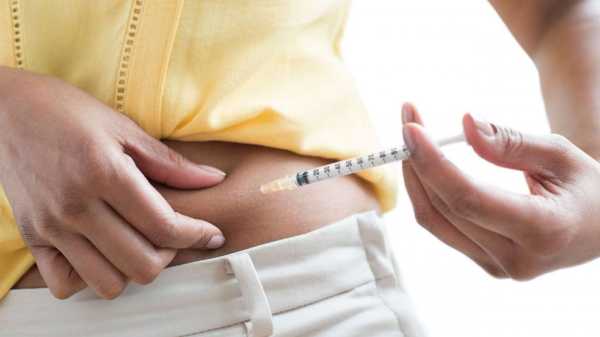Nearly 30% of Americans living with diabetes who are uninsured may ration their insulin to save money, according to a new study.
Researchers at Harvard Medical School, the City University of New York's Hunter College and consumer advocacy organization Public Citizen determined the prevalence of insulin rationing by analyzing the Centers for Disease Control and Prevention's 2021 National Health Interview Survey in the study, published in the Annals of Internal Medicine on Monday.
Overall, researchers found that 16.5% of adults with diabetes who use insulin — some 1.3 million Americans — rationed insulin by either skipping doses, taking less or delaying buying it to save money in the past year.

A woman appears to take insulin in this undated stock photo.STOCK PHOTO/Getty Images
Rates of insulin rationing were highest among those with no insurance, at 29.2%, the study found. Among those with private insurance, it was nearly 19%.
Rationing was lower among those with public coverage, such as Medicare (13.5%), and those ages 65 and older (11.2%), who would be largely eligible for Medicare.
Insulin rationing was also found to be more common among Black Americans (23.2%) than white and Hispanic (16%), as well as among middle-income insulin users (19.8%) than higher-income (10.8%) and low-income (14.6%), researchers found.
MORE: Type 1 Diabetes: The daily struggles of dealing with the invisible, incurable disease
There was no data provided on the health consequences of insulin rationing, though prior research has shown cost-associated non-adherence to insulin can have serious negative consequences.
The study "provides the first national estimate of how many Americans with diabetes are rationing their insulin now due to cost," Public Citizen said in a news release, noting that soaring insulin costs can average at least $1,000 each month.
Rationing insulin can put people at risk for serious and even deadly complications, experts say.
"In the ICU, I have cared for patients who have life-threatening complications of diabetes because they couldn't afford this life-saving drug," Dr. Adam Gaffney, a pulmonary and critical care physician at Harvard Medical School and the Cambridge Health Alliance and the lead author of the study, said in a statement. "Universal access to insulin, without cost barriers, is urgently needed."
MORE: COVID-19 infection increases risk of developing diabetes, study finds
The findings of the study come amid policy debates around the price of insulin.
The Biden administration's Inflation Reduction Act, which goes into effect next year, includes a provision to cap the monthly cost of insulin for people on Medicare at $35, though the bill excludes those on private insurance or the uninsured.
The initial draft of the bill would have also capped insulin costs for those with private insurance, though Republicans stripped that provision from the bill due to a technicality in the reconciliation process.
More than 37 million Americans have diabetes, according to the American Diabetes Association. Among them, 8.4 million use insulin, which costs 10 times more in the U.S. than anywhere else in the world, according to the association.
Sourse: abcnews.go.com






